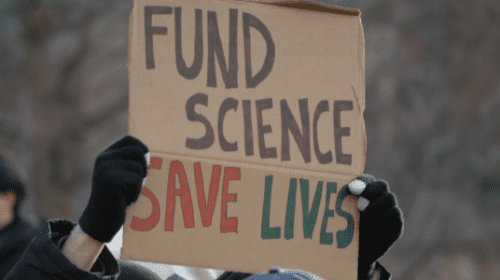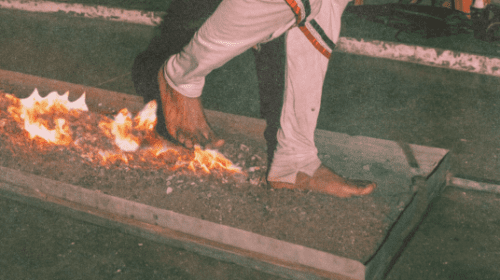Every January, tons of people—like hundreds of thousands—give up alcohol for the whole month. And for good reason. Alcohol is linked to seven different types of cancer, and according to the American Cancer Society, it’s one of the most preventable risk factors for cancer there is.
Additionally, research shows that heavy alcohol use increases anxiety and can induce panic attacks. Plus, life is way more fun to experience when you’re not buzzed or hungover, right?
The number of people opting to start the year alcohol-free has grown rapidly since 2013 when the Dry January movement began in the UK with roughly four thousand people.
The boozeless lifestyle has grown in popularity thanks to celebrities like Eminem, Jack Harlow, and Chrissy Teigen—all of whom talk openly about their decision to remove drinking from their lives.
Since Dry January became a thing, other months have followed suit. Now you can find people participating in Dry July and Sober October; the sober-curious crowd is also growing. People are starting to notice that alcohol isn’t doing them any favors, and taking a break can be good for you.
Beverage brands are jumping on this bandwagon big time with zero-proof beverages, like non-alcoholic beer and wine, and mocktails that taste just as good without the booze. Plus, in many cities, alcohol-free bars and bottle shops are popping up left and right. It’s a whole new world for folks choosing to abstain.
Although a month free of booze sounds like a walk in the park, it doesn’t come without challenges. So, if you’re considering Dry January, why not go for it?
Benefits of Dry January
Participating in Dry January makes you look better and become more popular, and as a bonus, all your problems will disappear! Just kidding! But there are a ton of benefits to going booze-free. So, let’s start with the good news.
Physical effects
No drinking means you are in full control of what you put into your body. No more making your Uber driver cruise through the drive-thru for a late-night fast food run at bar closing time.
And if your eating improves, other things will likely follow, like better digestion, clearer skin, more energy, and better sleep. Although individual results may vary, it doesn’t hurt to try, right?
Alcohol Change UK said that 70% of Dry January participants had better sleep during their month-long break from alcohol. And 66% of people had more energy. Plus, without nursing a hangover, you can get so much done!
Additionally, your risk for certain cancers goes down if you drink less. Alcohol is linked to esophageal, mouth, throat, larynx, breast, colorectal, and liver cancers. A 2018 study showed that a short-term break from alcohol in moderate to heavy drinkers improved insulin resistance, weight, blood pressure, and cancer-related growth factors.
Mental health benefits
We know that alcohol is directly linked to our mental health. And if you struggle with some mental health challenges, adding booze to the mix isn’t doing you any favors.
Alcohol is a depressant. Many people think that drinking eases their anxiety, which is true—but not for long. Once the booze starts wearing off, those anxious feelings come back, and for some, it can worsen their anxiety over time. This is often why it’s so hard for people who struggle with anxiety to cut back on drinking or remove alcohol from their lives entirely.
Financial benefits
Not drinking can save you some serious cash. According to Alcohol Change UK, 86% of participants save money during Dry January. If you dare to find out how much you’re dropping on booze, use an alcohol spending calculator. The results may surprise you.
Spending zero dollars on alcohol for an entire month could save you hundreds during Dry January alone, and it will help you see your spending clearly so you can reconsider where your money goes.
Time for personal growth
Cutting out alcohol can be challenging, especially if you’ve grown accustomed to a somewhat boozy lifestyle. Dry January is a good chunk of time, 31 days to be exact, where you can focus on other aspects of your identity.
With no hangovers holding you back, rediscover how you enjoy spending your time. Start new hobbies to keep yourself busy and finally get around to trying that new thing.
Skipping drinks when you’re stressed can be tough. During Dry January, you get to discover new ways to cope without alcohol as your trusty go-to. It will take some getting used to. But facing those challenging moments head-on builds your resilience and self-control.
Improved self-awareness is another big plus of trying Dry January. It’s a great time to recognize how much, how often, and why you reach for that drink. Some people realize they do it almost automatically, like a reflex. This month is your chance to break that habit loop and change how you make choices.
Challenges of Dry January
We think the benefits outweigh the negatives of doing a dry month, but there are still challenges to 31 days without alcohol. Luckily, we’ve got some tips to help you maneuver them, especially if you’re not used to a booze-free lifestyle yet.
Social pressure
The idea of peer pressure can be pretty scary for new non-drinkers, and being in social situations where alcohol is the main event can be difficult to navigate, especially if you’re not used to saying no.
How to deal: Tell your friends about your Dry January plans ahead of time and get yourself pumped up for all the benefits you’re about to experience. You might even convince someone else to take a break.
Have a game plan to navigate tricky situations, like suggesting alcohol-free drink options or politely saying “no thanks” to invites. Without booze directing your actions, you are completely in charge.
It’s OK to steer clear of people, places, and things where you may feel pressured to drink. If you’re struggling with this during the month, remember the benefits and why you’re taking a break.
Cravings
It’s totally normal to have a drink craving, especially if you’re used to drinking regularly. Everyone’s experience is different, and how cravings show up can vary.
Some people experience withdrawal symptoms like sweating, shakiness, or anxious feelings. If these symptoms get serious, you must seek help from a medical professional.
Withdrawal symptoms tend to happen within eight hours of your last drink but can happen up to several days later. If you’re a heavy regular drinker who stops suddenly, it’s a shock to your body and can be very dangerous, even deadly. Check with your doctor before trying Dry January if this concerns you.
How to deal: When a craving hits, distract yourself or do some deep breathing to calm your mind. Instead of alcohol, trick your brain by grabbing a replacement drink.
If you are having mild withdrawal symptoms from cutting back on drinking, remember to stay hydrated, eat well, get quality rest, and take it easy.
FOMO is real
Not drinking is a real challenge when booze is the life of the party at so many social events. Saying “just don’t go” might sound simple, but in reality, it’s not just the alcohol you’re skipping; it’s all the other fun stuff you feel like you’re going to miss out on.
How to deal: Don’t do it alone! Suggest participating in Dry January with your friends. Stay back from boozy events and have your own get-togethers without alcohol.
Change your FOMO to JOMO (joy of missing out). You get to experience a whole world of awesome activities without alcohol. Try new hobbies or dive into interests you’ve always wanted to explore. Find joy in things that aren’t centered around having drinks.
Failure happens
If you hit a bump during your Dry January commitment, first things first—be kind to yourself. It happens, and beating yourself up won’t make things better. Remember you’re doing your best; one slip doesn’t undo all your progress.
You can always try again tomorrow, start fresh, and keep going. Sure, “Dry February” doesn’t have the same ring to it, but it packs all the same benefits. It’s all about self-reflection and making better choices for our minds and bodies.
How to deal: To get back on track, avoid binge drinking. One slip-up doesn’t mean the entire month is a loss. Remember why you started Dry January and try to ease back into the booze-free challenge any time you can.
Dry January isn’t just a trend. It’s a chance to make a commitment to your health and explore life without relying on alcohol.
Remember, what you choose to do with your drinking habits is your call. But if you’re up for the challenge, Dry January can be a real game-changer for your well-being. Don’t believe us? Try it for yourself.
Dry January Resources
- Alcohol Change UK
- Search social media for hashtags like #DryJanuary, #AlcoholFree, and #SoberCurious on platforms like Instagram or Twitter. You’ll find a whole online space filled with people sharing their experiences, tips, and encouragement.
- Your community may have local support groups or events.
- Find individualized advice and support by contacting a medical or mental health professional.
- Apps like I Am Sober and Try Dry: The Dry January app are free and will help you along the way.

























